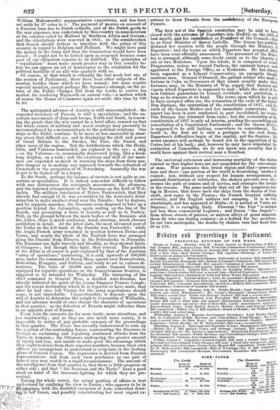To the South, perhaps the balance of succeis is not
quite so un- certain or speculative. It is indeed somewhat difficult to follow with any distinctness the retrograde movements, the advances, and the renewed retrogression of the Russians on the field of Wal- lachia. The military conclusion of Prince Paskiewitch, that they already had enough of it, was overridden by the Autocrat's deter- mination to snake another stand near the Danube ; but by degrees, and by separate marches, the Russians seem disposed to take up a position behind the Jalomnitza, again resting on the line of the Sereth, and presenting a front to Austria as well as to Turkey,. Still, on the ground between the main bodies of the Russians and the Allies, there is much confusion, much crossing, much obscure oscillation in. detail. At the latest date, the most advanced post of the Turks on the left bank of the Danube was Frateschti; while the Anglo-French army remained in position between Devno and Varna, and nearly the whole of the Turkish force was arranged along the Danube from Hirsova in the Dobrudscha to Nicopolis. The Russians can fight bravely and bloodily, as they showed lately at Giurgevo ; but though they fight, they retreat. The position of the Allies is of course in part explained by that of the Austrian "army of operations," numbering, it is said, upwards of 300,000 men, under the command of Baron Hess, spread over Transylvania, Bukowina, Hungary, and Gallicia, and ready to act in various di- rections. The force of 30,000 men under General Coronini, equipped for separate operations on the Transylvanian frontier, is supposed to be intended for Wallachia. The intrusting of the chief command to General Hess, a decided Anti-Russian, has already indicated the spirit of the young Emperor Francis Joseph; and the recent declaration which he is reported to have made, that after he had once left Vienna for the army negotiations should cease, is not improbable. Unquestionably, it depends upon the will of Austria to determine the complete evacuation of Wallachia, and her advance would at once change the character of operations in that quarter; as the defection of Prussia might influence them in an opposite part of Europe. From Asia the accounts are far more tardy, more circuitous, and less trustworthy ; and as they are also much more scanty, it is impossible to arrive at any probable synopsis of the proceedings in that quarter. The Times has recently endeavoured to sum up the position of the contending forces; representing the Russians in Georgia as sustaining and repulsing continued attacks from the Turks in Armenia ; the Ottomans undergoing the greater amount of injury and loss, and unable to make good the advantage which they ought to derive from their superior numbers, because their own officers are incompetent to understand or cooperate in the dashing plans of General Guyon. The impression is derived from Russian representations, and from such view perchance as one pair of honest eyes may snatch in a rapid reconnoissance. The amount of the intelligence from that quarter is, that there is little progress on either side ; and that "the Russians and the Turks" have a good stock on hand of the incessant fighting for which they are pro- verbial.
Taking the whole round, the actual position of affairs is best understood by conftning the view to Russia ; who appears to be in
rirrcrivivtgis, with the doubtful exception of Asia, somewhat draw- ,A-Swrn lel forces, and possibly concentrating her most urgent ex- (
,..,‘, _...._,
ertions to draw Prussia from the confederacy of the :Europe Powers.


























 Previous page
Previous page